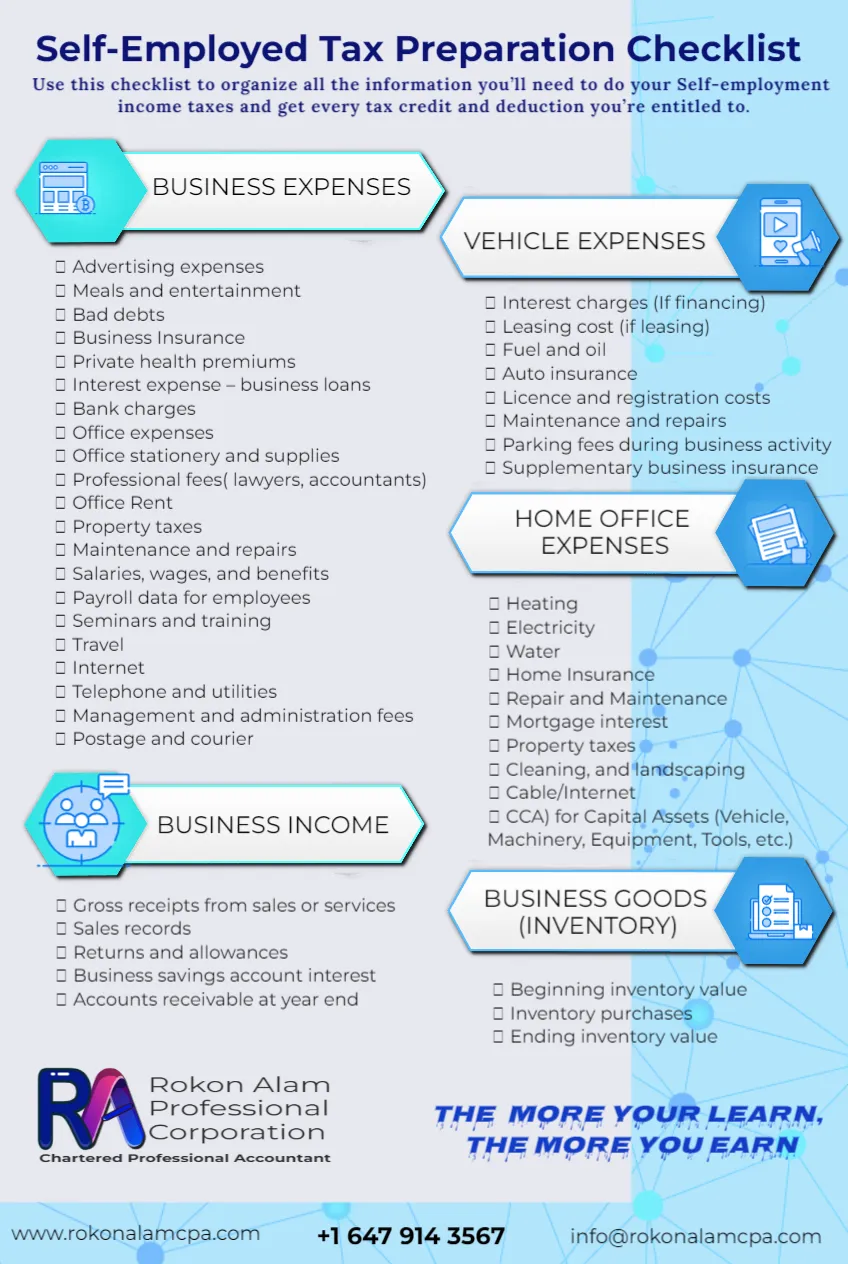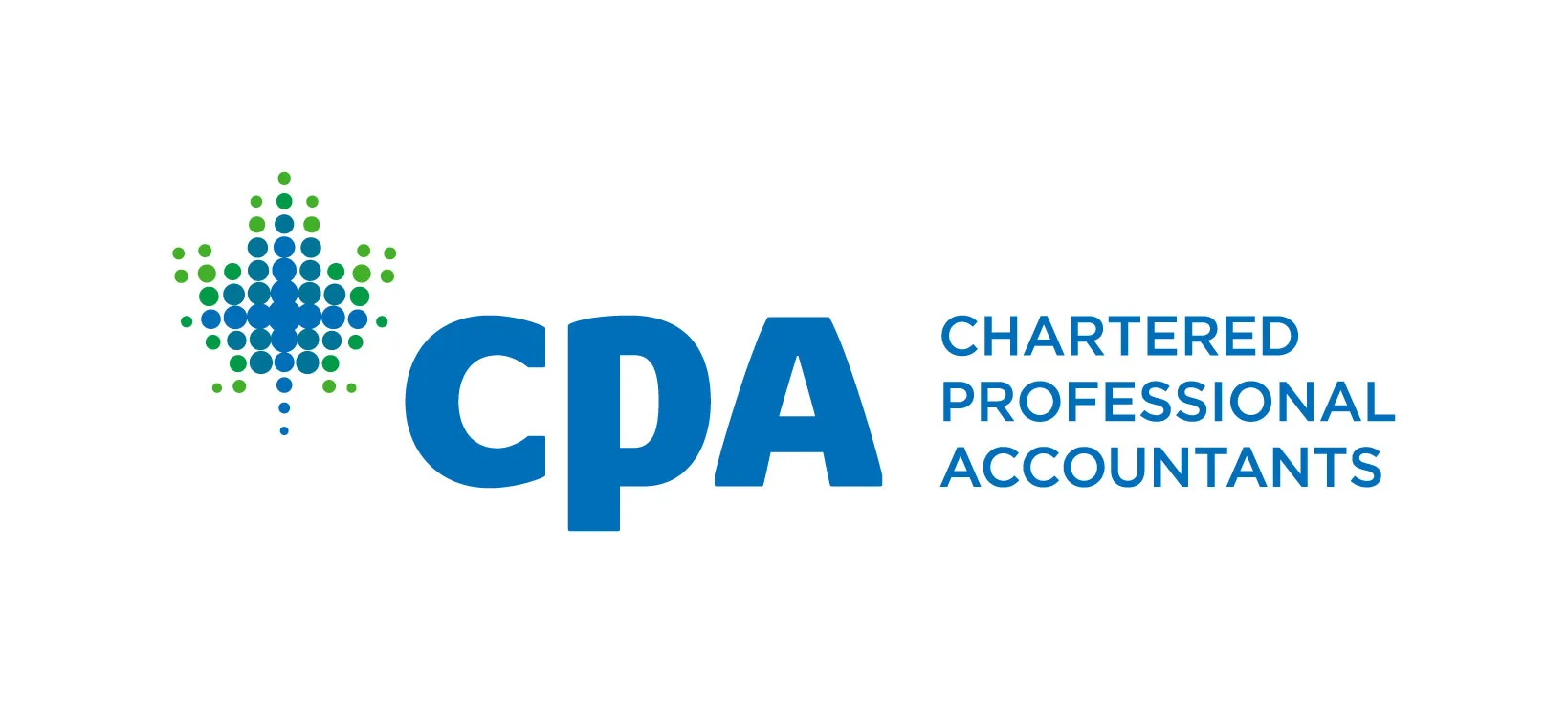Income Taxation for Self-Employed
You Built This on Your Own. You Shouldn’t Face Taxes Alone.
Being self-employed takes courage.
You manage clients, income, expenses, uncertainty—and somehow still find time to do the work you love.
But taxes?
That’s where many self-employed professionals feel overwhelmed, unsure, or worried about making mistakes.
As a CPA who has worked closely with entrepreneurs and independent professionals, I know this world well. And I know that self-employed taxes are never “one-size-fits-all.”
I take the time to understand how you earn, spend, and plan—so your tax return reflects your real situation, not assumptions.
No rushing.
No judgment.
Just clear guidance and personal attention.
If you want a CPA who understands the self-employed journey, I’d be honoured to help.

Understanding Self-Employed Individuals
Self-employed individuals in Canada are those who operate their own businesses or work as independent contractors. They are responsible for managing their businesses, determining their income, and handling their tax obligations. Understanding how income is taxed for self-employed individuals is essential for ensuring compliance with Canadian tax laws and optimizing financial management.

Tax credits and tax deductions
Self-employed individuals
Self-employed individuals in Canada can take advantage of various tax credits and deductions to minimize their tax liability. Here are some of the key ones, along with examples
Business Expenses
Self-employed individuals can deduct reasonable and necessary expenses incurred for earning income. This can include expenses such as office rent, utilities, office supplies, and travel costs.
Home Office Expenses
Self-employed individuals who use part of their home for business purposes can claim a portion of their home-related expenses as deductions. This includes a portion of rent or mortgage interest, property taxes, utilities, and maintenance costs.
Vehicle Expenses
If you use your vehicle for business purposes, you can claim a portion of the operating and maintenance costs. This includes fuel, insurance, and maintenance. You'll need to track your business-related mileage to determine the deductible amount.
Meals and Entertainment
Expenses related to meals and entertainment for business purposes are deductible. For example, if you have a business meeting with a client over lunch, a portion of the meal cost can be deducted.
Capital Cost Allowance (CCA)
Self-employed individuals can claim CCA on eligible capital assets used in their business. This includes assets like computers, vehicles, and machinery. The CCA allows you to recover the cost of these assets over time.
CPP Contributions
Self-employed individuals are responsible for both the employer and employee portions of CPP contributions. You can deduct your contributions on your tax return. The amount of the deduction is based on your net business income.
Employment Insurance Premiums
You can claim a deduction for EI premiums you pay as a self-employed individual. The maximum allowable deduction for 2021 was $856.36.
Professional Fees
If you incur professional fees, such as those paid to accountants or lawyers for business-related services, these fees are deductible.
Health Insurance Premiums
If you pay for private health insurance, you may be eligible to deduct a portion of the premiums as a self-employed business expense.

Challenges in Filing Tax Returns
Self-employed individuals in Canada face unique challenges when it comes to filing their tax returns. Some of the key challenges include
Income Reporting
Unlike salaried employees, self-employed individuals must accurately report their self-employment income, which can vary from month to month and year to year.
Quarterly Installments
Self-employed individuals are often required to make quarterly installments to cover their estimated tax liability. Estimating these accurately can be challenging.
Deductions and Expenses
Self-employed individuals can claim various deductions and business expenses, but identifying and maximizing these deductions can be complex.
Record Keeping
Effective record keeping is crucial to document income, expenses, and deductions. Maintaining organized records is time-consuming but essential for accurate tax reporting.

You deserve a better and worry free future
If you're self-employed in Canada and you're looking for expert guidance and support in managing your taxes and financial responsibilities, RAPC is here to help. We simplify the complexities of the Canadian tax system, ensuring that you can reduce your tax burden and focus on growing your business. Contact us today to learn more about our services and how we can assist you in your business journey
How We Can Help
At Rokon Alam Professional Corporation (RAPC), we understand the unique challenges self-employed individuals face when it comes to income taxation. We are experienced tax professionals dedicated to assisting you in various ways
Income Reporting
We help self-employed individuals accurately report their self-employment income, ensuring compliance with tax laws and minimizing the risk of audits.
Deductions and Expenses
We identify legitimate deductions and business expenses applicable to your self-employment, optimizing your deductions to reduce your tax liability.
Quarterly Installments
We assist in calculating and making accurate quarterly tax installments, ensuring you stay on top of your tax obligations and avoid penalties.
Record Keeping
We offer guidance on effective record keeping, providing tools and strategies to help you maintain organized financial records.
Personalized Guidance
Our services are tailored to your specific needs, providing you with personalized support required to navigate the Canadian tax system effectively.
Peace of Mind
With RAPC, you can experience peace of mind, knowing that experts are handling your tax matters, allowing you to focus on your self-employment and financial success.
Schedule your free 1-on-1 consultation
We will help you figure out how you can secure your future. After the consultation, you will feel more optimistic about your life.
Success Story
Navigating the Canadian tax system as a self-employed construction worker had its challenges. RAPC's expertise in taxation for self-employed individual provided clarity and peace of mind. Their team's personalized approach ensured that I maximized deductions. RAPC is my go-to for tax support
Carlos Hernandez, Construction Worker from Hamilton

Frequently Asked Questions
Everything you need to know about the Taxation of Self-Employed Individual
Built With NAVIGON Digital Marketing

